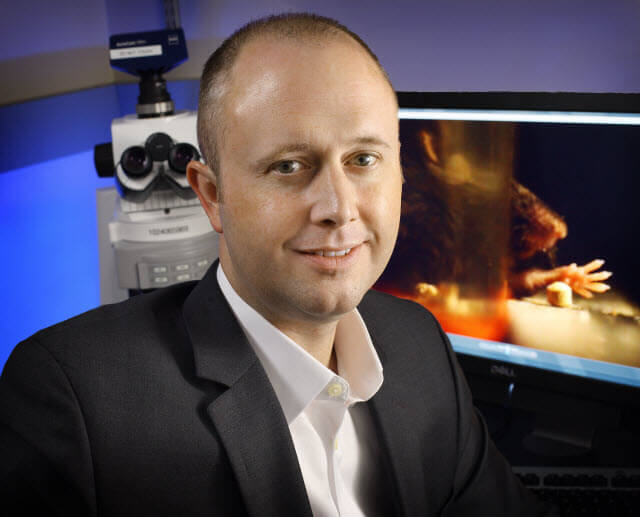The Zeiler Stroke Recovery Laboratory
At the Zeiler Stroke Recovery Laboratory, Dr. Steven Zeiler and his research team are broadening the understanding of how — and to what extent — motor recovery is possible after stroke.
Recovering Motor Skills after a Stroke
Improved acute stroke care means that more patients are surviving. Unfortunately, up to 60 percent of stroke survivors suffer disability in arm or leg use, and 30 percent need placement in a longer term care facility.
Recovering motor skills after stroke is essential to rehabilitation and the restoration of a meaningful life. Therefore, there is an urgent need to develop innovative new approaches to rehabilitation.
Most recovery from motor impairment after stroke occurs in the first month and is largely complete by three months. Improvement occurs independently of rehabilitative interventions (for example, physical and occupational therapy), which predominantly target function through compensatory strategies that do not constitute true recovery.
Dr. Zeiler and his team are conducting research to uncover how to augment and prolong this critical window of time.
Mouse Grabbing Animation
This animation demonstrates the task used by researchers at the Zeiler Stroke Recovery Laboratory in testing mice's function after stroke therapy.
Brain Recovery Research on Three Fronts
Dr. Zeiler has created a multi-modal set of three research endeavors aimed at testing stroke outcomes during the time period of heightened recovery. These projects are based on mechanisms known to measure and influence brain plasticity, and investigation of these areas holds promise for more complete recovery in stroke patients.
Ultra-High Field MRI Study of Brain Reorganization after Stroke
Using specialized MRI techniques, Dr. Zeiler’s team studies how brain reorganization evolves after stroke and interacts with training. This will allow a targeted understanding of where and when the brain adapts to and recovers from stroke.
Nutritional Modification and Enhanced Stroke Recovery
Dr. Zeiler’s team is modeling a lack of recovery in animals who undergo delayed training after stroke (which has previously been shown to lead to poor motor recovery) and is investigating caloric restriction, which has been shown to enhance brain plasticity and can restore improvement in recovery.
Medicines and Enhanced Stroke Recovery
The team is modeling a lack of recovery in animals who undergo delayed training after stroke and is testing the effects of both fluoxetine and Cerebrolysin® on restoring the recovery phase.
Collaborators
Ryan Felling, M.D. is the director of Johns Hopkins' Pediatric Stroke program. His research explores the cellular bases for repair and recovery following injury in the immature brain and.how neural progenitors respond to injury and how this response can be modified to improve recovery.
John W. Krakauer, M.D. is a professor of neurology at Johns Hopkins, an expert in motor control both before and after stroke, and is designing new forms of motor rehabilitation. Dr. Krakauer is principal investigator at the B.L.A.M Laboratory.
Kwan Ng, M.D., Ph.D. is a fellowship-trained neurologist at UC Davis specializing in vascular neurology and neuro-rehabilitation. His research interests include neural repair in white matter stroke, neuro-rehabilitation, and neurogenesis.
Noam Shemesh, Ph.D. is an investigator at the Champalimaud Center for the Unknown in Lisbon, Portugal. He has harnessed advanced MRI methods to investigate highly complex systems including the brain’s gray matter.
Rob Hubbard
Research Technologist

Mahlet Mersha, Ph.D.
Research Technologist



